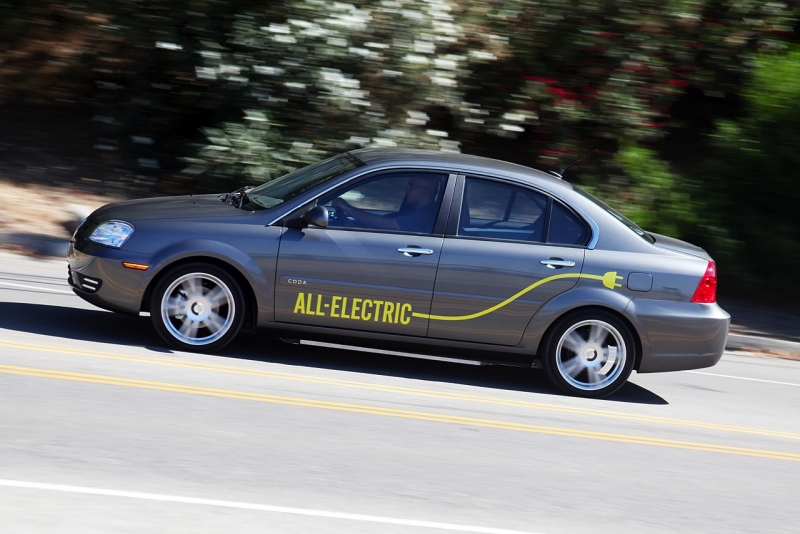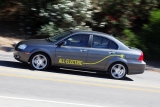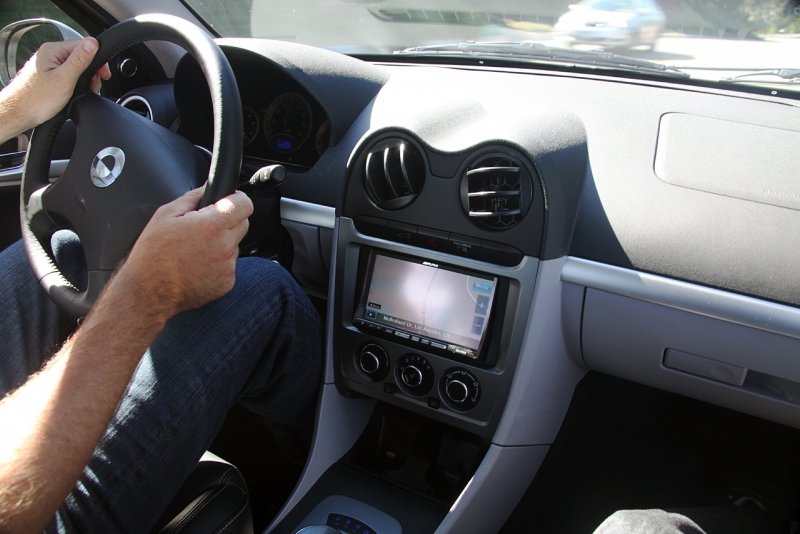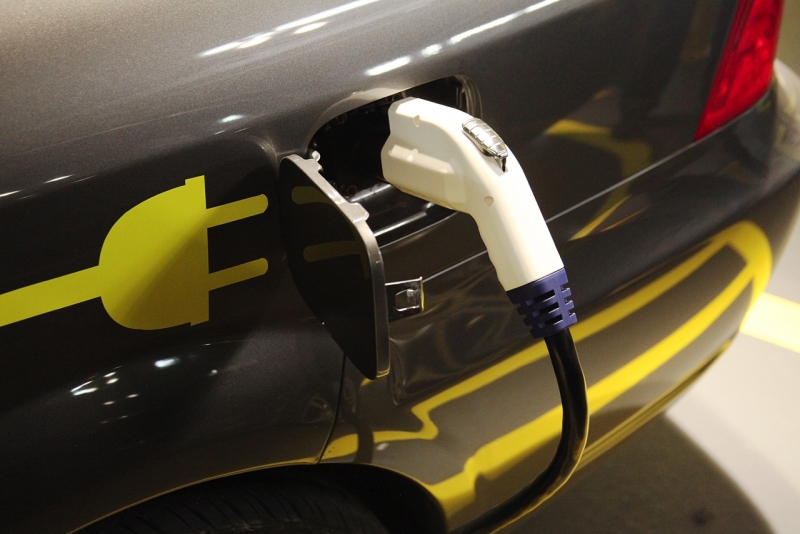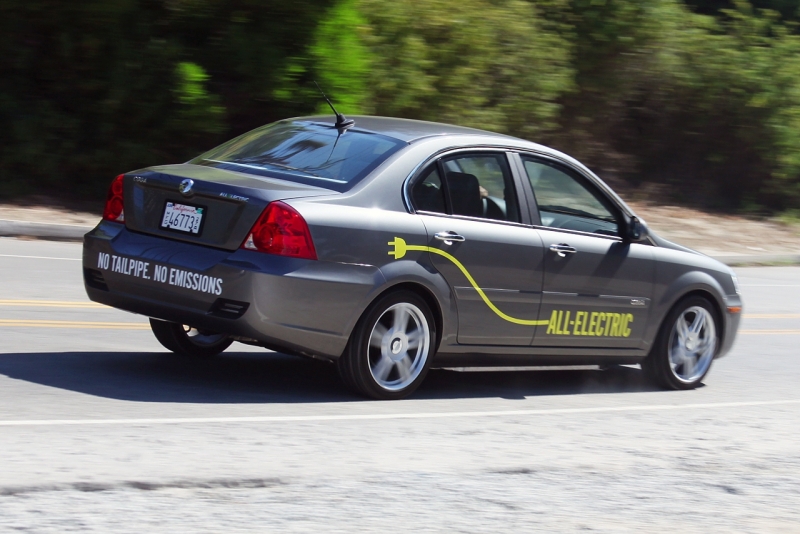2012 Coda Sedan
By Basem Wasef
Nissan's Leaf revolutionized how the public perceived electric vehicles. When it debuted in 2010, the five-passenger hatchback was the most car-like EV to date, offering all the creature comforts you'd expect from an internal combustion vehicle, along with the familiar driving characteristics. The only thing lacking, critics argued, was its less-than-optimal 73-mile cruising range.
Now that electric cars are no longer novel, mainstream manufacturers are rushing to hit the market with battery-powered rides of their own. Ford's Focus Electric is coming as a 2012 model, BMW will soon offer a lease-only ActiveE based on their 1-Series Coupe, and buyers craving pint-sized electrics will likely cross-shop the upcoming Smart Fortwo Electric Drive and Mitsubishi iMiEV.
Lurking outside the mainstream EV phenomenon is Coda, a three-year-old upstart that employs 160 people in Los Angeles, California, and 35 in China. Does their first offering—an unremarkable looking compact sedan priced at $44,900 before a $7,500 Federal tax credit—have what it takes to make a mark in this emerging field? To find out, we put a Coda sedan through its paces on crowded LA streets.
What’s to Like
You've gotta love a startup with the temerity to challenge multi-billion dollar manufacturers. It won't be easy for Coda to compete with the likes of Nissan and Ford (especially with such a visually indistinctive product), but their scrappy chutzpah should make for an interesting fight, not to mention their 6.6 kW charger which offers half the charge time of the Leaf's 3.3 kW unit.
You've gotta love a startup with the temerity to challenge multi-billion dollar manufacturers. It won't be easy for Coda to compete with the likes of Nissan and Ford (especially with such a visually indistinctive product), but their scrappy chutzpah should make for an interesting fight, not to mention their 6.6 kW charger which offers half the charge time of the Leaf's 3.3 kW unit.
What’s Not to Like
In a word, styling. Electric vehicles are all about a bright, gasoline-free future. Without sexy sheetmetal to back up their forward thinking drivetrains, EVs are missing out on a key component that sets them apart from the smog-spewing crowd. At $37,400 after tax rebates, the Coda is also inexcusably pricey; and finally, the oft-delayed sedan has been most recently promised for delivery by December 2011, but we won't be holding our breath.
In a word, styling. Electric vehicles are all about a bright, gasoline-free future. Without sexy sheetmetal to back up their forward thinking drivetrains, EVs are missing out on a key component that sets them apart from the smog-spewing crowd. At $37,400 after tax rebates, the Coda is also inexcusably pricey; and finally, the oft-delayed sedan has been most recently promised for delivery by December 2011, but we won't be holding our breath.
Driving Impressions
Our Coda test drive began at the company's first retail showroom, a slickly designed storefront at the tony Westfield Century City mall. We were warned that our tester was a pre-production model and not a reflection of the final version, so we tried to take that into account.
Our Coda test drive began at the company's first retail showroom, a slickly designed storefront at the tony Westfield Century City mall. We were warned that our tester was a pre-production model and not a reflection of the final version, so we tried to take that into account.
Off the line the Coda accelerates mildly, though it starts hitting its stride at around 35 mph, gaining momentum and revealing more engine responsiveness. There were some noticeable half-shaft resonances as the car accelerated, though we were told they'd be squelched in the final version. Throttle response was uncertain on steep hills, another characteristic Coda says will be smoothed out when the car reaches production. Absent from our tester was the so-called "GreenScreen" which displays efficiency information on a central monitor, so we made do with an analog dial on the dash that depicts battery draw and regeneration.
Thrust can be surprisingly satisfying once you've picked up some speed, and the Coda handles predictably (if a bit squishily), which is another area that promises to be refined by the time the car hits the market, as parts suppliers and tuning for the struts are still undecided.
Hot summer weather didn't keep the Coda's air conditioning from cooling the cabin effectively, which was appreciated as we crawled through traffic. And though this 3,670-lb sedan showed its heft on twisty Mulholland Drive, at least its torquey electric motor made for an entertaining (and nearly completely silent) jaunt through the curvy bits.
Engine and Drivetrain
The Coda sedan is powered by a permanent magnet AC motor producing 134 horsepower and 221 lb-ft of torque—more oomph than the Nissan Leaf. Power is routed to the front wheels through a one-speed BorgWarner transmission, but the selling points here are the 728-cell lithiumiron phosphate battery pack and the 6.6 kW onboard charger, which promises a full charge from a 220-volt, 30-amp setup in only six hours.
The Coda sedan is powered by a permanent magnet AC motor producing 134 horsepower and 221 lb-ft of torque—more oomph than the Nissan Leaf. Power is routed to the front wheels through a one-speed BorgWarner transmission, but the selling points here are the 728-cell lithiumiron phosphate battery pack and the 6.6 kW onboard charger, which promises a full charge from a 220-volt, 30-amp setup in only six hours.
Green Evaluation
The Coda sedan is EPA rated with a range of 110 miles, though Coda says that restrained drivers can eke out as many as 150 miles from a charge. A full charge should run around $1.20 during off-peak (night) hours, while that figure can climb to just $3.60 during the day—one of the most compelling reasons to buy electric.
The Coda sedan is EPA rated with a range of 110 miles, though Coda says that restrained drivers can eke out as many as 150 miles from a charge. A full charge should run around $1.20 during off-peak (night) hours, while that figure can climb to just $3.60 during the day—one of the most compelling reasons to buy electric.
Vehicle Details
Features and Technology
Surprisingly, the Coda sedan's bloated MSRP gets even higher if you want yours in red or blue; those hues add $495 to the vehicle's $44,900 price tag, which doesn't include an $895 destination charge. At least a Federal tax credit shaves $7,500 from that figure, as does additional state incentives. Santa Monica Alloy Black wheels run an additional $495, and if the standard Eco-Fabric interior made of recycled materials is too bleak for your tastes, a leather and premium audio package pads the price by $1,295. Trimmed out to the max, the Coda will run $48,080 before tax credits.
Surprisingly, the Coda sedan's bloated MSRP gets even higher if you want yours in red or blue; those hues add $495 to the vehicle's $44,900 price tag, which doesn't include an $895 destination charge. At least a Federal tax credit shaves $7,500 from that figure, as does additional state incentives. Santa Monica Alloy Black wheels run an additional $495, and if the standard Eco-Fabric interior made of recycled materials is too bleak for your tastes, a leather and premium audio package pads the price by $1,295. Trimmed out to the max, the Coda will run $48,080 before tax credits.
Despite the ho-hum interior and the 1990s-era body sourced by Chinese supplier Hafei, the Coda's bland skin hides some compelling battery technology. Thanks to an onboard 6.6 kW charger (which will soon become an industry standard for EVs), 40 or 50 miles of range can be gleaned from only two hours of charge time. The lithium iron phosphate (LiFePO4) battery isn't the most exotic formulation, but its stability and longevity enable some bold claims: only seven percent battery degradation after the first 100,000 miles, and eighty percent of its original capacity after 300,000 miles. While its 6.6 kW charger enables fast refills, it will soon be featured on competitors like the 2012 Ford Focus Electric.
Interior
Our tester was a pre-production unit, so we took its hard plastic bits with a grain of proverbial salt, as Coda promises they'll be replaced with soft touch materials. Of particular note was the shifter, a large, palm-sized cylinder finished in plastic that recalls the spun zinc unit found in Jaguars of late. Though the concept is novel, this particular application doesn't work as well as it might when the car comes to market; there's a lag between clicking the shifter into position, and the actual time it takes for the transmission to respond. Here's to hoping the production version has that bug sorted out.
Our tester was a pre-production unit, so we took its hard plastic bits with a grain of proverbial salt, as Coda promises they'll be replaced with soft touch materials. Of particular note was the shifter, a large, palm-sized cylinder finished in plastic that recalls the spun zinc unit found in Jaguars of late. Though the concept is novel, this particular application doesn't work as well as it might when the car comes to market; there's a lag between clicking the shifter into position, and the actual time it takes for the transmission to respond. Here's to hoping the production version has that bug sorted out.
Exterior
Welcome to blandsville. This is one of the most visually anaesthetized sedans we've ever laid eyes on, which is a real shame since its beigeness belies the technology hidden beneath those body panels. One Coda exec says it will take about a year and a half for a redesign. We think that can't happen soon enough.
Welcome to blandsville. This is one of the most visually anaesthetized sedans we've ever laid eyes on, which is a real shame since its beigeness belies the technology hidden beneath those body panels. One Coda exec says it will take about a year and a half for a redesign. We think that can't happen soon enough.
Market Segment and Pricing
Nissan's Leaf is currently the benchmark in this soon-to-be-expanding segment, and the Japanese hatchback's refined on-road demeanor and nicely finished interior make its pre-rebate price of $35,200 rather attractive compared to the Coda's $44,900 MSRP. Though the Coda's charge time and range trump the Leaf's, we're guessing its perceived value will be tough to justify, since its exterior styling and interior appointments lag behind the Nissan's.
Nissan's Leaf is currently the benchmark in this soon-to-be-expanding segment, and the Japanese hatchback's refined on-road demeanor and nicely finished interior make its pre-rebate price of $35,200 rather attractive compared to the Coda's $44,900 MSRP. Though the Coda's charge time and range trump the Leaf's, we're guessing its perceived value will be tough to justify, since its exterior styling and interior appointments lag behind the Nissan's.
What We Think
In spite of their practical limitations, electric-powered vehicles are becoming increasingly attractive to city dwellers with shorter commutes. The Coda wins on several levels—charge time and range—while lagging in others—styling and pricing. Though we didn't get a full grasp of the Coda's interior appointments and driving dynamics due to the vagaries of our pre-production test car, we certainly hope it comes to market within its promised time frame of December 2011. Whether or not Coda can meet that deadline is anyone's guess, though we suspect the corporations that have funneled over $300 million in investments will see to it that they do.
In spite of their practical limitations, electric-powered vehicles are becoming increasingly attractive to city dwellers with shorter commutes. The Coda wins on several levels—charge time and range—while lagging in others—styling and pricing. Though we didn't get a full grasp of the Coda's interior appointments and driving dynamics due to the vagaries of our pre-production test car, we certainly hope it comes to market within its promised time frame of December 2011. Whether or not Coda can meet that deadline is anyone's guess, though we suspect the corporations that have funneled over $300 million in investments will see to it that they do.
|
|
Track Your Service Records
Get Recall Alerts
Get Updated Value Estimates on Your Car.
Go to a Review
Similar Articles
Popular Car Articles
Latest Car Reviews
Auto Tools
Local Guides
All Guides
Alabama
Alaska
Arizona
Arkansas
California
Colorado
Connecticut
DC
Delaware
Florida
Georgia
Hawaii
Idaho
Illinois
Indiana
Iowa
Kansas
Kentucky
Louisiana
Maine
Maryland
Massachusetts
Michigan
Minnesota
Mississippi
Missouri
Montana
Nebraska
Nevada
New Hampshire
New Jersey
New Mexico
New York
North Carolina
North Dakota
Ohio
Oklahoma
Oregon
Pennsylvania
Rhode Island
South Carolina
South Dakota
Tennessee
Texas
Utah
Vermont
Virginia
Washington
West Virginia
Wisconsin
Wyoming
Alabama
Alaska
Arizona
Arkansas
California
Colorado
Connecticut
DC
Delaware
Florida
Georgia
Hawaii
Idaho
Illinois
Indiana
Iowa
Kansas
Kentucky
Louisiana
Maine
Maryland
Massachusetts
Michigan
Minnesota
Mississippi
Missouri
Montana
Nebraska
Nevada
New Hampshire
New Jersey
New Mexico
New York
North Carolina
North Dakota
Ohio
Oklahoma
Oregon
Pennsylvania
Rhode Island
South Carolina
South Dakota
Tennessee
Texas
Utah
Vermont
Virginia
Washington
West Virginia
Wisconsin
Wyoming

